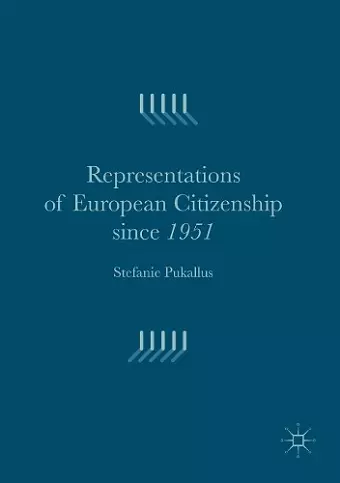Representations of European Citizenship since 1951
Format:Paperback
Publisher:Palgrave Macmillan
Published:3rd Jan '19
Currently unavailable, and unfortunately no date known when it will be back

"Pukallus provides an ambitious interpretation of five representations of European citizenship that she uncovers as part of a continuous European civil narrative. By analyzing a range of sources including interviews with key officials, the book demonstrates that the Commission reinterprets the meaning of European citizenship depending on the institutional, political, economic and historical context but with the singular aim of stimulating a European civil consciousness. A must-read for scholars of European citizenship, civil society, and media studies." (Willem Maas, York University, Canada) "An original contribution to the literature, this book provides an important argument on studying European citizenship as a set of "civil representations". The historical approach of the book is especially rewarding as it unpacks the normative visions of EU decision-makers in crafting citizenship 'beyond the nation-state'. It should be compulsory reading for anyone interested in the topic of citizenship in the EU." (Espen D. H. Olsen, University of Oslo, Norway) "A sophisticated and innovative attempt to trace the way in which the European Commission's approach and attitude towards European citizens has evolved over time." (Pies Ludlow, London School of Economics, UK)
This book is a study of the multiple meanings of European citizenship, which has been represented and publicly communicated by the European Commission in five distinctive ways – Homo Oeconomicus (1951-1972), A People's Europe (1973-1992), Europe of Transparency (1993-2004), Europe of Agorai (2005-2009) and Europe of Rights (2010-2014).This book is a study of the multiple meanings of European citizenship, which has been represented and publicly communicated by the European Commission in five distinctive ways – Homo Oeconomicus (1951-1972), A People's Europe (1973-1992), Europe of Transparency (1993-2004), Europe of Agorai (2005-2009) and Europe of Rights (2010-2014). The public communication of these five distinct representations of European citizenship reveal how the European Commission conceived of and attempted to facilitate the development of a Civil Europe. Ultimately this history, which is based upon an analysis of public communication policy papers and interviews with senior European Commission officials past and present, tells a story about changing identities and about who we as Europeans might actually be and what kind of Europe we might actually belong to.
“The main strengths of this book are the vast and unique materials analyzed and how the sources are woven together to form a rich account of the history of European citizenship, relating both to successes and failures. Pukallus manages to bring life to her story by highlighting the role played by specific individuals in this history.” (Jonna Johansson, Journal of Common Market Studies JCMS, Vol. 56 (04), May, 2018)
ISBN: 9781349702350
Dimensions: unknown
Weight: unknown
281 pages
1st ed. 2016